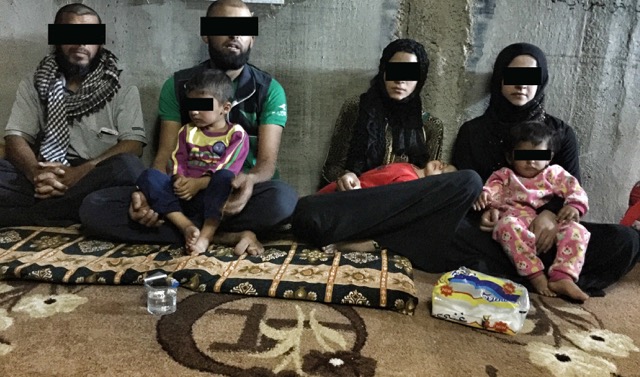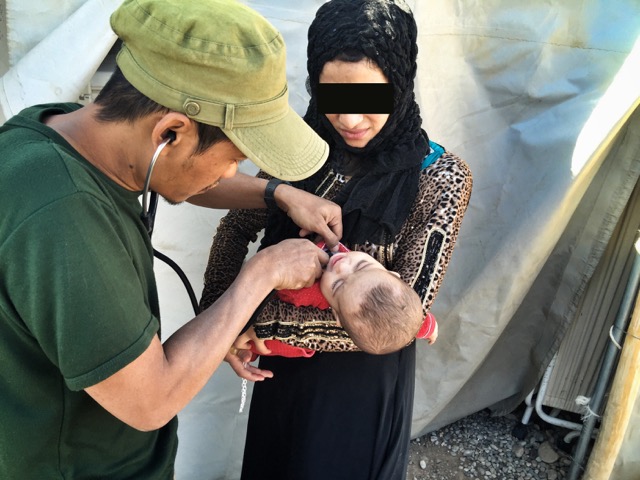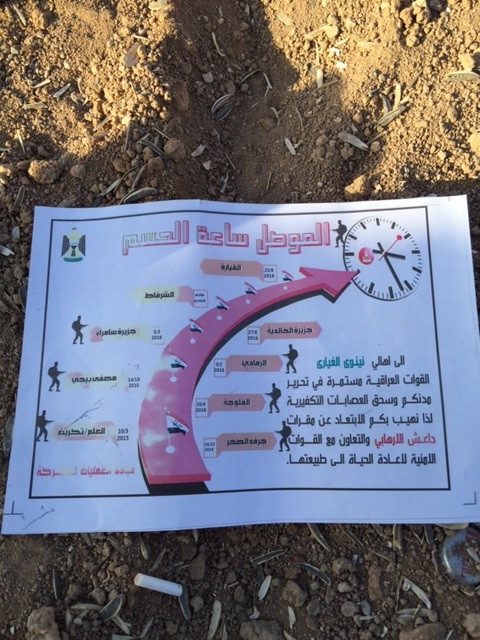Escaping Mosul: Interview with a Family Who Ran Away
10 October 2016, Peshmerga Front-line Command Post, Bashiqa front line, Iraq

On the evening of 1 October, nine people slipped through the dusk to the outskirts of Mosul and on into the empty darkness northeast of the city. They were on foot, two women carrying babies, one small child and four men. Some 30km away, at the Peshmerga command post above the ISIS-occupied town of Bashiqa, those guarding the line got the word: Nine people coming towards you from Mosul.
As well as they could, the Peshmerga tracked them. At a certain point, two of the men broke away and headed back toward Mosul, the ISIS-occupied bastion that was one of their most dramatic victories in June 2014 and now sits restlessly under the threat of an impending counter-attack. Three weeks ago coalition air support dropped leaflets over the city advising the people to flee if they could and to stay away from ISIS, because there will be no mercy shown when the attack begins. Some are heeding and just last week a group of 20 people – men, women and children – were received here and sent on to Erbil for processing.
The small group of 1 October was intercepted early in the morning of October 2nd after walking most of the night. Now only seven people, the Peshmerga soldiers brought them to this command post and began the process of clearing them to continue on – and also feeding them breakfast.
The family had just finished eating when we were given the go-ahead to talk with them. We crowded into a small, dimly lit bunker that was about at capacity with the combination of Pesh intelligence, a Czech journalist, our group and the family themselves. The small child, a boy of about three years, whimpered quietly, afraid and exhausted. One of the men was with his family, a wife and two children. The other woman with a baby had a husband already in Erbil. The second man sat silently to the side, while the father answered most of the questions.
They had left Mosul because things were getting very bad; now there was no food. They had heard on the radio that the offensive would happen on the 19th. So they decided to go. It was not so hard as there has been decreased presence of ISIS lately. So they said they weren’t worried about any repercussions to their families who stayed behind, only they knew that if they left their house they would lose it. Before ISIS had come, they had a normal and a good life. After ISIS, things gradually became worse. Now civil society was in shambles: there was no healthcare, no education system, very little information from the outside world, no food in the markets – and no freedom. The women were afraid to walk alone on the streets – ISIS had threatened that any one they caught out without a male relative would be captured and forced to become a soldier.
More ominously, before, Mosul had been a city of many different kinds of people and religions: Christians, Muslims and Yezidis and others, living together. Now the others were gone. This Muslim family didn’t know where, or what had happened to them; they had no stories of executions in the street or any of the brutality for which ISIS has become famous. There had just been a quiet disappearance. They thought many of the Christians had run away but did not know any details. Their story was one of the slow disappearance of all the things that make a life; finally, this family had decided to escape, before they too were disappeared.
As the Peshmerga hurried them towards the car that would take them to Erbil and an uncertain future, we gave each of the three children a GLC bracelet as a reminder that they aren’t alone and God has a plan for them. Toh, a Karen medic, was able to treat the smallest baby, who was coughing uncontrollably. They got in a small white car, trailed by an armored truck, and headed off.

About thirty minutes later, a Peshmerga officer reported back to us that they had discovered evidence suggesting the small, quiet man was actually ISIS. He would be separated from the others, and his case investigated. And so begins the process of not just taking back land from ISIS, but people. As disputed as the newly-liberated land will be, justice will be most difficult to enact in the liberated people.

